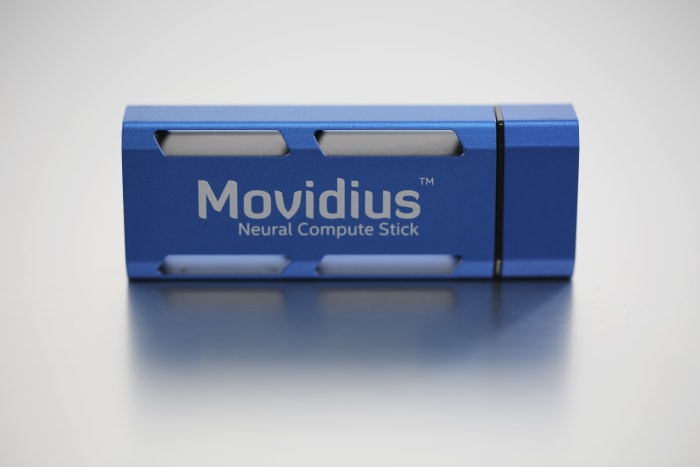Technical documents
Specifications
Brand
IntelKit Name
Neural Compute Stick 2 (NCS2)
Kit Classification
Development Kit
Country of Origin
China
Product details
Intel NCS2 Neural Compute Stick 2
The Neural Compute Stick 2 (NCS2) is a USB stick which offers you access to neural network functionality, without the need for large, expensive hardware. It enables you to incorporate computer vision and artificial intelligence (AI) to your IoT and edge devices. Neural network is a way in which we are able to teach machines to learn like humans.
The Intel NCS2 is based on the Intel Movidius™ Myriad™ VPU which has a dedicated hardware accelerator for DNN interference. The NCS2 is supported by the OpenVINO™ Toolkit.
This is the perfect tool for developers, data scientists, industrial engineers, AI engineers and academics.
How does it work?
The Neural Compute Stick 2 has a USB 2.0 connector which is inserted into your host device, for example a PC, laptop or single board computer (SBC). It is a plug-and-play device so you are ready to start prototyping right away.
The OpenVINO™ Toolkit is there to help you accelerate your deep neural network designs and ideas. It is a high performance, high-efficiency, open-source platform which offers compatibility across different platforms.
Features of the NCS2
Latest NCS model from Intel
Plug-and-play USB format
Perfect for Deep Neural Network applications (DNN)
Features the Intel® Movidus™ Myriad™ X VPU
High performance
Low Power
NCS1 vs. NCS2
The Neural Compute Stick 2 is the latest model from Intel. The main difference between the two models is that the NCS1 uses the Myriad 2 VPU while the NCS2 uses the Myriad X VPU. The previous NCS1 version can be found here - (139-3655)
What is it capable of?
The NCS2 development tool is a means to enabling your imagination. The functionality of this tool can be used to recognise faces, objects or even emotions from an image input. This categorisation of data can then be converted into an action.
For example, Australia’s Little Ripper Lifesaver UAV used the Intel NCS to monitor the New South Wales coastline and identify sharks. This data provided immediate danger detection and enabled more response time.
What is the Neural Network?
Neural networks, also referred to as deep learning, is a type of machine learning that enables us to organise and categorise data from image and video analytics. Deep neural networks (DNN) are slightly more complex, with a minimum of 2 layers.
It works by using a series of algorithms which reflect aspects of how our brain functions. They identify correlations in data and use this to group items together. Neural networks are able to organise data that is not labelled or structured beforehand.
An example of neural network is to detect people’s faces from images and video. Going one step further, the neural network could also be used to detect their emotion.

Stock information temporarily unavailable.
P.O.A.
1
P.O.A.
Stock information temporarily unavailable.
1

Technical documents
Specifications
Brand
IntelKit Name
Neural Compute Stick 2 (NCS2)
Kit Classification
Development Kit
Country of Origin
China
Product details
Intel NCS2 Neural Compute Stick 2
The Neural Compute Stick 2 (NCS2) is a USB stick which offers you access to neural network functionality, without the need for large, expensive hardware. It enables you to incorporate computer vision and artificial intelligence (AI) to your IoT and edge devices. Neural network is a way in which we are able to teach machines to learn like humans.
The Intel NCS2 is based on the Intel Movidius™ Myriad™ VPU which has a dedicated hardware accelerator for DNN interference. The NCS2 is supported by the OpenVINO™ Toolkit.
This is the perfect tool for developers, data scientists, industrial engineers, AI engineers and academics.
How does it work?
The Neural Compute Stick 2 has a USB 2.0 connector which is inserted into your host device, for example a PC, laptop or single board computer (SBC). It is a plug-and-play device so you are ready to start prototyping right away.
The OpenVINO™ Toolkit is there to help you accelerate your deep neural network designs and ideas. It is a high performance, high-efficiency, open-source platform which offers compatibility across different platforms.
Features of the NCS2
Latest NCS model from Intel
Plug-and-play USB format
Perfect for Deep Neural Network applications (DNN)
Features the Intel® Movidus™ Myriad™ X VPU
High performance
Low Power
NCS1 vs. NCS2
The Neural Compute Stick 2 is the latest model from Intel. The main difference between the two models is that the NCS1 uses the Myriad 2 VPU while the NCS2 uses the Myriad X VPU. The previous NCS1 version can be found here - (139-3655)
What is it capable of?
The NCS2 development tool is a means to enabling your imagination. The functionality of this tool can be used to recognise faces, objects or even emotions from an image input. This categorisation of data can then be converted into an action.
For example, Australia’s Little Ripper Lifesaver UAV used the Intel NCS to monitor the New South Wales coastline and identify sharks. This data provided immediate danger detection and enabled more response time.
What is the Neural Network?
Neural networks, also referred to as deep learning, is a type of machine learning that enables us to organise and categorise data from image and video analytics. Deep neural networks (DNN) are slightly more complex, with a minimum of 2 layers.
It works by using a series of algorithms which reflect aspects of how our brain functions. They identify correlations in data and use this to group items together. Neural networks are able to organise data that is not labelled or structured beforehand.
An example of neural network is to detect people’s faces from images and video. Going one step further, the neural network could also be used to detect their emotion.

